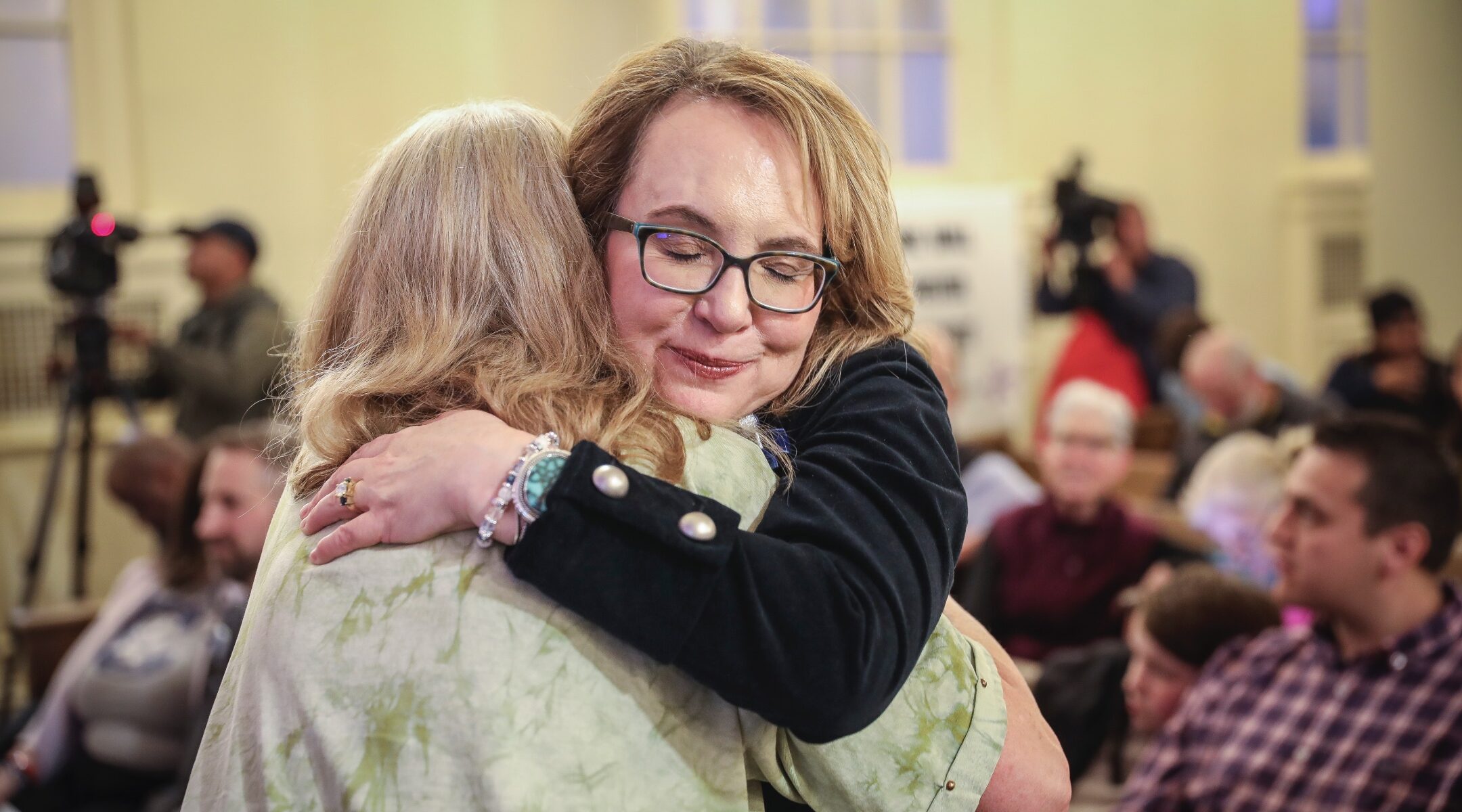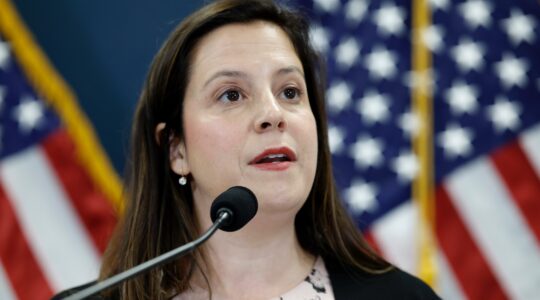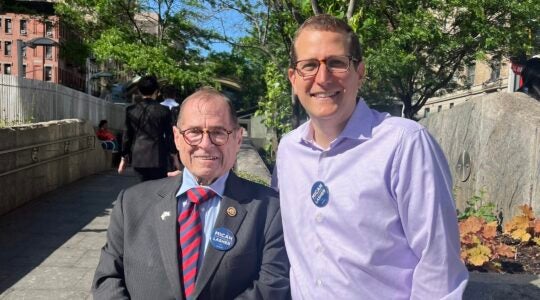WASHINGTON — Gabrielle Giffords is known for breaking barriers. But the former congresswoman may soon be in a position to continue a tradition: Jewish spouse to a vice president.
That’s because Giffords, who is out front about her Jewish identity, is married to Arizona Sen. Mark Kelly, a leading contender to be Kamala Harris’ running mate. If Kelly gets the nomination and wins office, Giffords would succeed Harris’ husband, Doug Emhoff, as the second consecutive Jewish spouse in the vice presidential residence. Kelly’s selection would also mark the first major party ticket in history where both candidates are married to Jews.
Another leading VP contender, according to reports, is Pennsylvania Gov. Josh Shapiro, who would become the first Jewish vice president if the ticket won. Shapiro’s wife, Lori, is likewise Jewish.
In either case, it appears increasingly likely that, if Harris wins in November, the mezuzahs Emhoff had installed at the vice president’s residence could stay up.
Giffords and Kelly, who is a retired astronaut, were among the first to endorse Harris after Biden gave his vice president his blessing. For more than a decade, Giffords has been best known for surviving a 2011 assassination attempt at a constituent meet and greet. Afterward, she and Kelly founded a gun control advocacy group bearing her name.
Before the attack, Giffords was a youthful and gregarious presence in Congress who stood out for her relatively conservative bona fides — a must for a Democrat from the swing state of Arizona.
She was also known for wearing her Jewish identity on her sleeve.
The daughter of a Jewish father and a Christian Scientist mother, Giffords credited her singular embrace of Judaism to a 2002 trip she took to Israel.
“It just cemented the fact that I wanted to spend more time with my own personal, spiritual growth. I felt very committed to Judaism,” Giffords told The Arizona Star in 2007 of the trip, which was organized by the American Jewish Committee’s Project Interchange, an initiative that cultivates promising beginner politicians. (Secretary of Transportation Pete Buttigieg is another alum.)
“Religion means different things to different people,” Giffords said then. “It provides me with grounding, a better understanding of who I came from.”
It was clear from the essay she wrote for Project Interchange that she fell hard for the country and its contradictions. “It is a land where Orthodox Jews wearing clothing that was fashionable 300 years ago pose for digital pictures taken by tourists wearing the most modern fashions,” she wrote.
Speaking to the Jewish Telegraphic Agency just after her 2006 election, during the congressional orientation, she said the women on the father’s side of her family set an example she wanted to emulate.
“In my family, if you want to get something done you take it to the Jewish women relatives,” she said then. “Jewish women, by and large, know how to get things done.”
That wasn’t just talk: Heading into the 2006 congressional election, she reached out to Jewish Democratic congresswomen to fundraise for her, including Shelley Berkley of Nevada and Debbie Wasserman Schultz of Florida.
In Congress, Giffords almost immediately established herself as a pro-Israel hawk, sponsoring legislation to close loopholes that allowed Iran to buy parts for combat aircraft.
Her relationship with Wasserman Schultz, which dated to when they were both in their respective state legislatures, developed into the deepest of friendships. Wasserman Schultz and another member of Congress’ freshman class of 2006, now-New York Sen. Kirsten Gillibrand, flew to Giffords’ bedside after the 2011 shooting (in which, incidentally, a bandage invented in Israel helped save her life). The first people Giffords saw upon opening her eyes in the hospital were Kelly, whom she had married in 2007, Wasserman Schultz and Gillibrand.
Wasserman Schultz told CNN after the shooting that her pleading to Giffords to get better so they could hang out at Wasserman Schultz’s New Hampshire summer home is one of the things that prompted Giffords to open her eyes.
“The only way I could describe the feeling that we had, that I had, was other than the birth of my kids, this was the most incredible feeling, to see literally your — one of your closest friends just struggle to come back to you, to come back to her family, to come back to her friends,” Wasserman Schultz told reporters.
Giffords at first was determined to continue her service as a congresswoman, She returned in August, just months after she was shot, to cast a vote on a debt ceiling bill, and the House resonated with cheers. But it was too much, and a year after she was shot she announced — using the hesitant speech she had relearned after her injury — that she was resigning.
“I don’t remember much from that horrible day, but I remember the trust you put in me to be your voice,” she said. “I have more work to do on my recovery but to do what is best for Arizona I will step down this week.”
The trauma lingers. Giffords was among the first to speak out after the attempted assassination earlier this month of Donald Trump, the Republican former president who will be running against Harris.
“Political violence is terrifying. I know,” Giffords said. “I’m holding former President Trump, and all those affected by today’s indefensible act of violence in my heart. Political violence is un-American and is never acceptable — never.”
She remained determined to make an impact after leaving office, founding the advocacy group that became “Giffords” a year after her resignation, in 2013. She appeared at the christening of a Navy ship named for her in 2015, campaigned for her husband in 2020 and spoke at the virtual Democratic convention the same year.
In 2021, she celebrated her bat mitzvah after 20 years of study at Congregation Chaverim of Tucson, with Kelly in attendance. Rabbi Stephanie Aaron, who married the couple under a chuppah, or Jewish wedding canopy, presided over the service.
“My Torah portion is from Genesis, from the story of Joseph,” Giffords told the Forward. “If you know Vayeshev you know it begins ‘And he lived.’ Any story that begins ‘and he lived’ is good with me. I lived. Everything afterwards is a gift.”
JTA has documented Jewish history in real-time for over a century. Keep our journalism strong by joining us in supporting independent, award-winning reporting.






